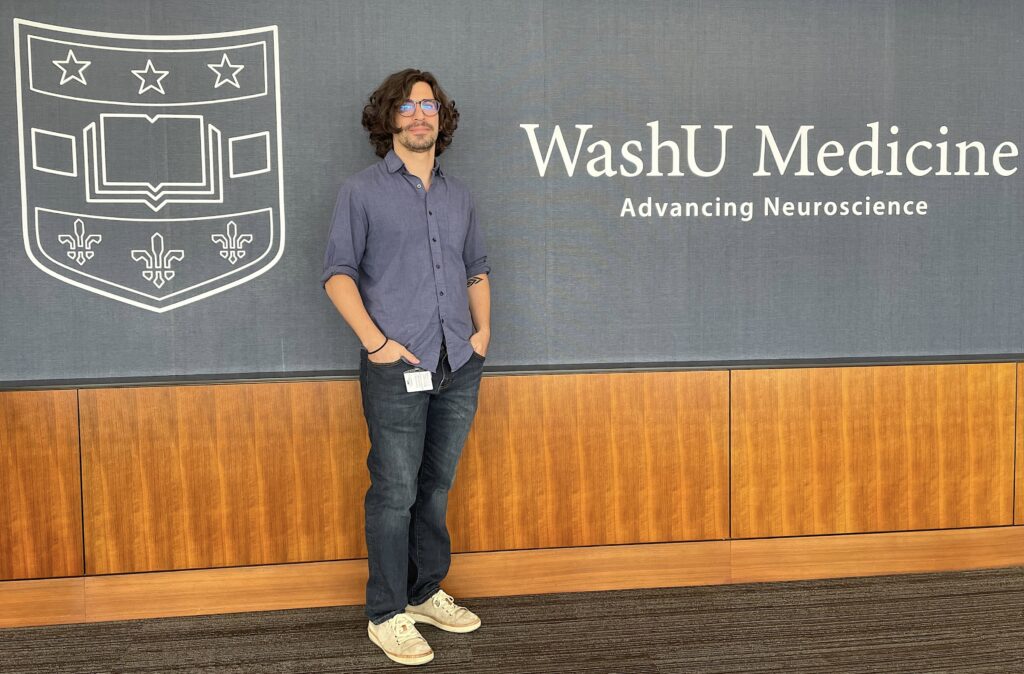Leandro Fosque, PhD, is using an F32 grant to explore the complex relationship between sleep and neural plasticity.

National Research Service Award.
Leandro Fosque’s research recently took a huge step forward.
A postdoctoral fellow in the Center for Theoretical & Computational Neuroscience (CTCN) at Washington University, Fosque has been awarded an F32 Ruth L. Kirschstein Postdoctoral Individual National Research Service Award.
A National Institute of Neurological Disorders and Stroke grant, the F32 provides funds for research training to promising postdoctoral candidates who show the potential to become productive researchers in scientific health-related research fields.
“Receiving the F32 is a big milestone for me,” said Fosque, whose project is titled “Extracting Network-Level Homeostatic Rules for Sleep/Wake States.” “It gives me the financial security to focus on research for the next three years. It is designed to strengthen my training, allowing me to gain new skills in experiments and theory that will be useful when I decide to run my lab. Also, since I developed the project plan myself with the help of my collaborators, it feels like a great opportunity to pursue what I’m passionate about.”
Fosque’s project will explore the complex relationship between sleep and neural plasticity. He hypothesizes that experience-dependent changes in neuronal circuits undermine optimal information processing, increasing the need for sleep. To further examine this relationship, he is developing a machine learning algorithm to extract the dynamical rules for sleep homeostasis. He also will conduct experimental work to test the plasticity thresholds in neural circuits and create a model to build predictions and test the mathematical limits of such a problem.
“My original interest in network adaptation in the face of external stimuli is best represented at a global scale in the wake/sleep transition,” Fosque said. “During wakefulness, the brain is continuously bombarded by external stimuli, pushing it towards a phase transition, i.e., wake to sleep. At this point, the brain needs to switch to sleep to recover its optimal computational state while at the same time maintaining a structure of the learned experiences. My goal for the F32 is to find and predict the onset of this phase transition. I’m trying to determine the point that the network must surpass to trigger sleep and to understand, at a fundamental computational level, the necessity of being offline during sleep.”
“I think interdisciplinarity is the only way we’re going to be able to tackle the current complex problems in neuroscience.”
Leandro Fosque
Since being named the CTCN’s inaugural postdoctoral fellow in 2023, Fosque has worked in the labs of Keith Hengen, PhD, an assistant professor of biology, and ShiNung Ching, PhD, an associate professor of electrical and systems engineering. His work there inspired the development of the F32 project.
Fosque earned his PhD in physics at Indiana University. Using interdisciplinary tools such as machine learning algorithms and mathematical models is critical to his work, which involves model building, simulations and highly complex and high-dimensional data.
The CTCN serves as a collaborative hub for Fosque’s research. The center includes Schools of Engineering, Medicine and Arts & Sciences faculty working together to solve some of the current problems facing neuroscience and artificial intelligence.
“I think interdisciplinarity is the only way we’re going to be able to tackle the current complex problems in neuroscience,” he said. “And, thankfully, the CTCN at WashU serves this very purpose. Physics offers much, but control theory and dynamical systems provide different perspectives that sometimes escape physicists. And, of course, we need experimental neuroscientists to keep us grounded in biological reality. Luckily, the Hengen lab has cutting-edge technology for chronic single-unit recordings focusing on sleep, and the Ching lab offers expertise in control theory and dynamical systems, which is crucial for understanding network adaptation and learning.
“By thinking outside of our fields, we can avoid biases and expand our understanding, moving outside of our own Plato’s caves.”
While the F32 will help fund Fosque’s research for the next three years as he investigates sleep at its fundamental level and its potential connection to better artificial neural network algorithms, the award also is preparing him for his next career step.
“Professionally, I plan to remain in academia, with a balanced focus on research and teaching,” he said. “I discovered during my graduate years that I enjoy teaching because that’s when I learn the most, and it is rewarding to see when students grasp a new concept.”